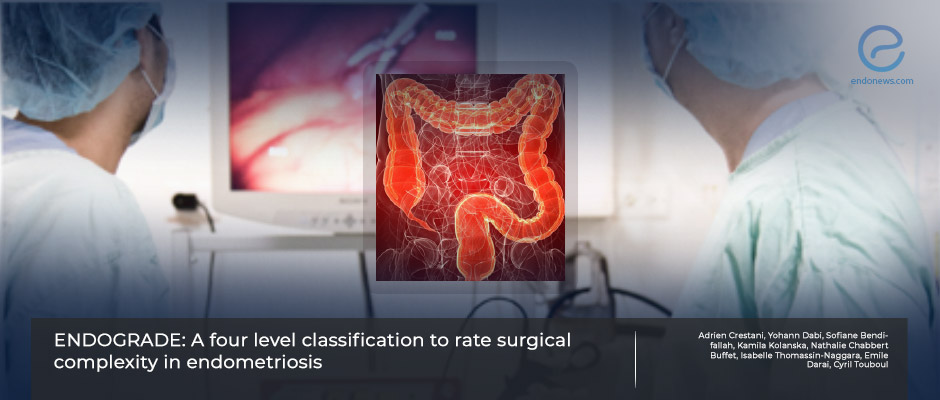A new classification called ENDOGRADE to rate surgical complexity in deep endometriosis.
Aug 31, 2023
"Endograde classification" mirrors operating time and perioperative complications.
Key Points
Importance:
- The current classification systems reflect the 'depth' and the 'invasion pattern' of endometriotic lesions.
- There is a need for a classification reflecting the surgical complexity of endometriosis operations.
Highlights:
- The "Endograde classification system" is correlated with the operating time and perioperative complications for patients with deep endometriosis.
What's done here:
- Using a retrospective longitudinal database of 764 cases who underwent endometriosis surgery, a postoperative classification of surgical complexity in endometriosis was established.
- French research team named this "ENDOGRADE" where the technical difficulty of surgery is reflected in four grades.
- Statistical analysis of operating time and perioperative surgical complications was made to test the ENDOGRADE classification.
Key results:
- Operating time was longer for patients for each Endograde level.
- Eighty % of perioperative complications occurred in patients Endograde 3 and 4.
- According to multivariate analyses, patients with Endograde 2 and 3 experienced approximately 10 times more postoperative complications than Endograde 1.
Limitations:
- To test the usefulness of this newly designed grading system for DE, it would be necessary to work on different miscellaneous databases.
Lay Summary
Correlation with patient outcomes could not be identified in most endometriosis classification systems including the commonly used revised ASRM. Therefore, in addition to grading the depth and invasion pattern of the lesions, there is a need for a classification system to cover the operation time and perioperative outcomes.
Crestani et al. from the Department of Obstetrics and Gynecology of Sorbonne University, France, developed a new grading system named "ENDOGRADE", in which the difficulties of surgical techniques are divided into four grades. To create the new grading system, the authors modeled the cancer surgery classification that considers surgical procedures rather than patients' characteristics. The authors then retrospectively tested the Endograde classification system on a database of the endometriosis surgeries performed in their clinic over ten years.
Endograde classification covers the surgical complexity in terms of operation time and includes intra and postoperative complications.
The authors believed that this system would eliminate the lack of objective evaluation of the complexity of surgical procedures and better serve other teams, also mirrors the patient endometriosis situation to plan postoperative care.
This paper was recently published in the Journal of Gynecology Obstetrics and Human Reproduction.
Research Source: https://pubmed.ncbi.nlm.nih.gov/37473962/
surgical complexity postoperative complications surgeon skills Endograde classification deep endometriosis.

